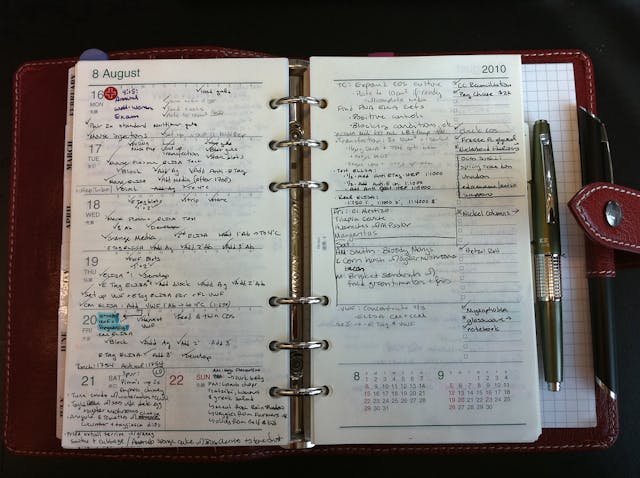
Your Employees Aren't Working 40 Hours Per Week
The traditional work week is highly inefficient. If we really want 40 hours, let's get 40 hours of actual work done.
Articles are popping up everywhere about the end of the 40-hour work week:
- Why The 40-Hour Work Week Is Dying
- The 40-hour workweek is on its way out
- The death of the 40-hour workweek
Two of the three of these articles reference burnout, but they all mention that the average employee works more than 40 hours every week.
Is that true?
Wasting Away The Work Day
Let's examine the 40-hour work week schedule. While there are countless variations, we'll just look at some common scenarios.
For this exercise, we're going to assume this average person arrives and leaves on time.
40 + 5 + 5 = 40
Before we even talk productivity, how much time does it take to get to 40 hours in your company's eyes?
Most office jobs tend to use an 8-5 schedule. Have you ever noticed 8-5 is nine hours?
You've already been forced into five hours of breaks throughout the week. These breaks are at a time your company wants you to take a break, not necessarily when you need a break.
Add your commute. Commutes differ by person, location, and random circumstance. My sister averaged about 2.5 hours/day in Boston last year. In Cincinnati, my coworkers spend between 15 minutes and 1.5 hours in the car every day. And a study of 10 US cities found the average commute to be between 20-40 minutes. So let's call it 30 minutes.
There you go. You've added five hours to your work week getting to and from work.
So, for the person that arrives at 8:00, leaves at 5:00, and doesn't open her computer in the evening, it takes 50 hours to work 40 hours.
Setting Up
Have you ever watched how someone begins their day? Have you paid attention to beginning of your day? Holy smokes!
By the time you set your 12 bags on your desk, plug in all your electronic cords, it's been a few minutes. But, now you need coffee. And who are you going to run into on your way to those sweet, sweet beans?
And then you're ready to work, but now you've been away from Facebook for so long, you just need a little peek.
I do it, too. There are days when I look at the clock when I'm about to start working and I've been at work for 45 minutes (please don't tell my boss).
I'll be reasonable and say it takes about 30 minutes to begin your day. So now you've lost 2.5 hours of your work week just starting your days.
Meetings
We all know meetings can be a huge waste of time. But even in ignoring that, look at the time before and after a meeting. Tasks don't magically run right up until a meeting starts. You have to be smart with your time. You can rarely work on the most important task before a meeting, stop right before the meeting begins, then pick it up when the meeting ends.
There is all kinds of data around this, but we're going to say 15 minutes to transition in either direction.
So, how many meetings do you have?
I probably have about 5 meetings on a light week. Add another 2.5 hours. But wait! Are any of those meetings out of the office? For some people, no. For many of us, yes.
Let's add another meeting to your week, but this one is 30 minutes away. Now we're at 3.5 hours/week just in the time surrounding meetings.
Social Media
Look, I check my social accounts at work. We all do it. Some of us do it much more than others, and that should be clear.
I'll give this average person the benefit of the doubt and say they spend a little more than 10 minutes/day distracting themselves. Add another hour to the week.
Appointments
Then there's that doctor's appointment, or the extended lunch date, or that errand that you just have to run at 2:00.
I'm sure you've found another hour to waste somewhere in the week with something unrelated to work.
Interruptions
And finally, interruptions. Rarely are interruptions warranted, and they are ever so destructive to productivity.
Interruptions that take a few seconds are usually harmless. Once it starts to creep into a minute, the interrupted person has likely lost their place in their current task.
An interruption that lasts a few minutes could steal 15 minutes (or more) of someone's day.
How often are you interrupted? Let's stay conservative and say twice a day, or 2.5 hours of productivity each week.
To tally it all up, that average person we created is away from their home/pet/family for 50 hours every week. In that time, they only spend 40 hours of it working, according to their company. But, they probably only spend about 30 hours actually working.
And between you and me, 30 hours is incredibly lenient. I think it's much closer to 20-25 hours for your average employee. I wanted to at least make 30 seem plausible.
Are You Working More Than 40 Hours?
The CNN article I referenced earlier mentioned a Gallup survey that found the average work week length to be 47 hours.
Using the math above, even if we say the extra seven hours this average person works are undistracted at home, they still aren't at 40 hours. Remember, they had 10 hours to make up.
What's Really Wrong?
I could go on forever on this topic, and I will certainly explore it (and its potential solutions) more over time. However, my point in counting these hours is to redirect your attention on the problem with the 40-hour work week:
It takes a lot more than 40 hours to get 40 hours worth of work accomplished.


